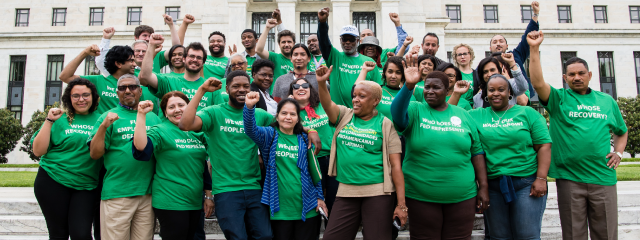Blog
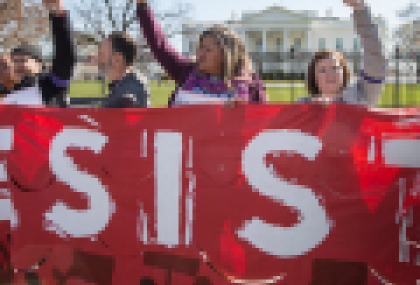
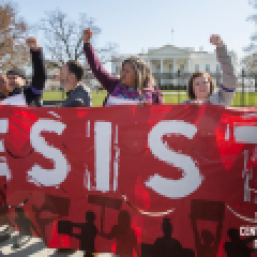
Re-pledge yourself to the resistance in 2018! From January 31 to February 2, President Trump will meet with Republican members of Congress for a legislative retreat at the Greenbrier resort in West Virginia. CPD and our allies are bringing together thousands of people from across the country to gather outside the Greenbrier and voice our opposition to Trump’s agenda for the coming year. Please join us to march, chant, sing, and meet fellow passionate voices of resistance.
Need a ride and a place to crash? Our sister organization, CPD Action, is sponsoring buses to West Virginia from several cities, including NYC, Westchester, NY, Washington, DC, Pittsburgh, PA, Washington, PA, Little Rock, AR, and Wilmington DE. Find a bus near you and sign-up here!
Can’t make it? Help us spread the word online by marking yourself as interested on our Facebook event and invite your friends to join us in resistance!
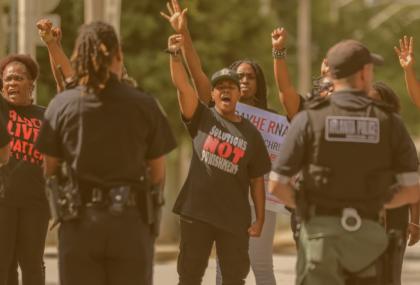
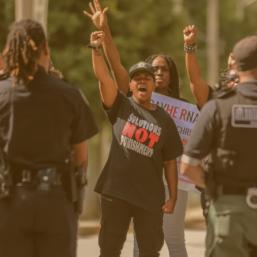
Last year presented tremendous challenges and struggles for racial justice. State-sponsored attacks on immigrant and Muslim communities coupled with brazen endorsements of white supremacy across the country left leaders needing a space to regroup and strategize about how electeds are leading in a powerful way. Local Progress, a national network of progressive elected officials, and the CPD Racial Justice team organized a strong group of elected and community leaders, with 60 Local Progress members and executive directors of Black-led community organizations across the CPD Network coming together last month in Baltimore, MD for a conversation on racial equity.
This group dug into Local Progress’ police reform work - discussing everything from asset forfeiture and use of force, to officer training and bans on profiling. We also spent time thinking more broadly about what safety means in communities, learning about CPD’s Freedom to Thrive framework and the ways in which budgeting processes can bring about equity in our communities. Ultimately, leaders grappled with how to shift the narrative on what public safety is and what communities really need to succeed.
This convening allowed elected officials and community leaders across the country to share resources and learn from each other. In two days, leaders built strong connections and community to sustain the work on racial justice and equity in the long term. People left the convening, a space full of collaborative spirit and shared learning, energized and ready to go back to their communities to carry the work forward. You can see photos from the convening on Facebook!
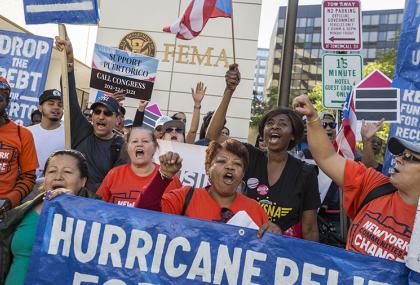
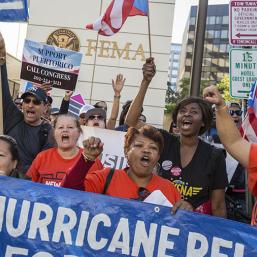
Nearly four months after Hurricane Maria devastated Puerto Rico, incredible numbers of people are still without power, major segments of the population have no access to clean running water, roads are destroyed, and impacted people continue to die. The most vulnerable communities, as always, have been ravaged the worst.
Yet in the midst of this darkness, there has been light. Thanks to major online giving, significant foundation donors, support from celebrities, and dozens of locally organized fundraising events throughout the country, the Maria Fund -- a hurricane relief and rebuilding fund for Puerto Rico housed at CPD -- has raised nearly $4.8 million since Hurricane Maria made landfall of September 20, 2017. Already supporting an impressive 33 grassroots, community-based initiatives focused on vital relief and rebuilding work throughout Puerto Rico, the fund has supported vital community organizing, provided food, cleared roads, connected residents to essential services, and more.
The Maria Fund is deeply committed to supporting community organizing work that will build an equitable Puerto Rico over the long-term. As in New Orleans after Hurricane Katrina, in the months and years after climate disasters like Maria, vulnerable communities are largely left out of rebuilding initiatives. Too often, the destruction is used by developers and corporations as an opportunity to turn a profit, privatize public services, and displace communities. Support for community organizing in this context is critical to support a Puerto Rican future of equity and sustainability rather than displacement and deepened inequality.
Guided by a committee made up entirely of Puerto Rican leaders, focused on transforming the root causes of the crisis, and committed to the development of a new sustainable and equitable Puerto Rico, the Maria Fund will continue to drive vital support to frontline social change initiatives and transformative change projects in Puerto Rico over the coming months. Please donate today!
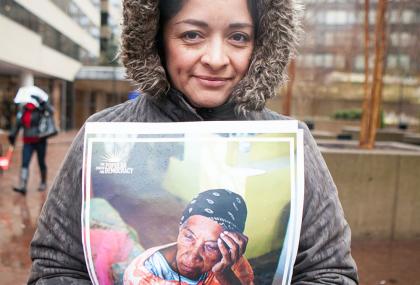

CPD partners, including the Make the Road family, New York Communities for Change, and Organize Florida, have joined the national #Power4PuertoRicocampaign to advocate for a just recovery for Puerto Rico, putting the lives of Puerto Ricans before corporations and millionaires who stand to profit from the islands humanitarian crisis.
Last December, our partners made thousands of calls to members of Congress, asking them to stop the tax bill that will take 200,000 jobs from an already crippled Puerto Rican economy. On December 20th, the CPD Network joined ten cities, including Bridgeport, CT, Elizabeth, NJ, Reading, PA, Orlando, FL New York City, Los Angeles, Oakland, Boston, Seattle and even as far as London, for an International Day of Action targeting TPG, a multi-billion dollar corporation that, through its Puerto Rican affiliate, has been aggressively foreclosing on houses in Puerto Rico even after the devastating Hurricane Maria. The action led to TPG putting a moratorium on most of its foreclosures in Puerto Rico, and sparked an ongoing conversation about how the company can support families after the moratorium ends.
Of course, the fight continues as the road ahead to equitably rebuild Puerto Rico will be long. On January 22, CPD partners will hit the streets for a Back-to-School Week of Action. Our message is clear: private education institutions in the United States need to be held accountable for their bad investments that are now destroying public education on the island.
Until we get justice for Puerto Rico, there will be many more opportunities to participate in the local and national mobilizations throughout the course of the campaign. If you’d like to get connected to a local campaign, participate in our national mobilizations and/or get training on how you can lead your own actions, please email our team.
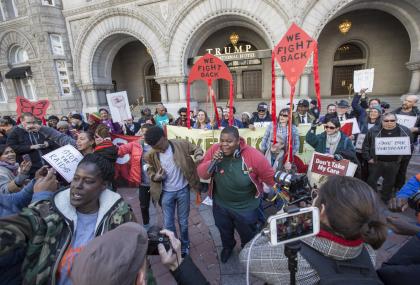
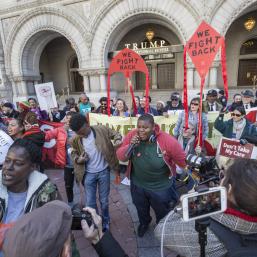
This has been a terrifying year—a year in which our communities and our values have been under bitter and sustained attack. With the first year of the Trump administration not yet over, already we have witnessed an attempted ban on Muslims entering the country, a prolonged campaign to remove healthcare from millions, the repeal of DACA, the gutting of vital federal agencies such as the EPA, support for white supremacists, and now, as we write, a federal tax bill aimed at giving the richest 1% the largest cash handout in recent memory.
This year has proven that disdain for our values and hatred towards our communities, espoused by Trump and his acolytes, runs far deeper than many thought possible. We also understand more clearly that repressive forces see a huge opportunity over the coming three years to dramatically change the course of history, to fundamentally roll back decades of progressive reform, and to lead this country to an entirely different place—a truly terrifying place for communities of color, immigrants, and working-class communities.
We simply cannot, and will not, let this happen.
Yet despite these discouraging events, much about this year has been immensely inspiring and heartening. Time and time again, we have witnessed communities standing up for each other to resist and work together to build a society around our shared values. Black, brown, white, immigrant, middle class and working class, united by a common cause: to build a society based on love, respect, and mutual cooperation.
Just this Wednesday, nearly 300 protesters trained by CPD, were arrested for civil disobedience after standing up to members of Congress who voted yes on the GOP tax package. The bill will steer billions away from working families and into the pockets of the richest Americans, while ripping away healthcare from 13 million people over the next decade.
In May, over 2,000 activists from ten states joined CPD and partners at the Texas State House in response to local anti-immigration policies. This huge public display of opposition was cited by the Texas court as a significant factor in its decision to block these policies at that time.
In July, after six months of protest and actions that saw tens of thousands travel to Washington DC in wave upon wave of action, the bill to remove health care from millions was finally defeated in a vote of 49–51. CPD and our partners were on the front lines of this massive campaign.
After the shocking events in Charlottesville, VA in August, we organized rallies and vigils across the nation to confront white supremacy, honor those whose lives were lost, and send a clear message to the nation and beyond - this is not our America.
Also this year, Oregon and New York City passed fair scheduling legislation, marking the first state-level victory and largest city-level action on this cutting-edge policy. Many thousands of people from our partners and allies have worked tirelessly over recent years to achieve these historic gains for working families.
And so we saw again this year that when we come together, and when we organize well, we can win.
As we look ahead to the coming year, we know we are just getting started. This year’s hard and bitter fight will, without doubt, become more intense next year. We will need to be stronger and better organized than ever before to build a society based on our values.
We cannot do this without your help.
Please join us in building the strong, national movement for change we need now more than ever and donate to the Center for Popular Democracy this giving season.
In solidarity,
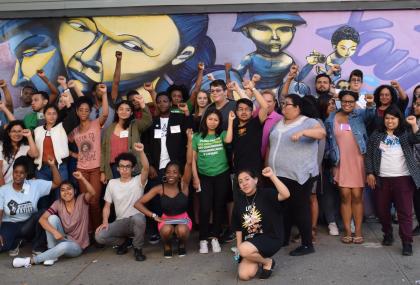
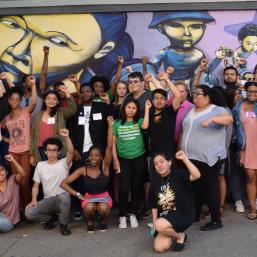
On October 14, CPD’s Education Justice team organized a panel discussion at the 2017 annual Network for Public Education (NPE) conference in Oakland, CA, titled, “Community Schools as a Bulwark Against Privatization.” The panel featured Irene Robinson from Kenwood Oakland Community Organization (KOCO), Martha Sanchez from Alliance for Californians for Community Empowerment (ACCE), Elzora Cleveland from Coalition for Educational Justice (CEJ), and Kate Terenzi from the Center for Popular Democracy.
Panelists began by telling the audience about the devastating impacts of underinvestment in public schools and the proliferation of education privatization (and other kinds of privatization) experienced by communities across the country. They described: school closings, the destruction of neighborhoods and communities through gentrification, food deserts, and the influx of charter and voucher schools that implement harsh disciplinary practices and pull public tax dollars from the public schools. Often, public schools, particularly in Black and brown communities, are starved of essential resources, then deemed to be "failing" before they are closed or handed over to charter schools. Each panelist shared stories about local organizing work and campaigns aimed at reversing these trends, but also highlighted Community Schools as both tactical responses to the proliferation of charters and vouchers and as a visionary solution to struggling public schools.
CPD’s own Kate Terenzi highlighted the fact that NYC spends around $764 million dollars a year on policing public schools overwhelmingly attended by Black and brown youth -- a fundamental contributor to the city's school-to-prison pipeline. She also described the Young People’s School Justice Agenda, developed by the Urban Youth Collaborative, that demands the divestment of at least $66 million dollars from policing schools and investment in restorative justice programs and policies instead. Restorative justice, rather than punitive and exclusionary discipline, is one of the key pillars of the Community Schools model.
While education privatization has long been touted as the only solution to struggling public schools, the panel not only demonstrated this to be a false narrative, but also provided critical examples of ways communities are resisting the privatization of education and calling instead for sustainable Community Schools. For example, more than 20 CPD affiliates across the country have already been building campaigns to demand Community Schools, while saying no to privatization, and no to charters and vouchers. To learn more about the value of Community Schools see CPD's report Community Schools: From Struggling Schools to Thriving Schools.
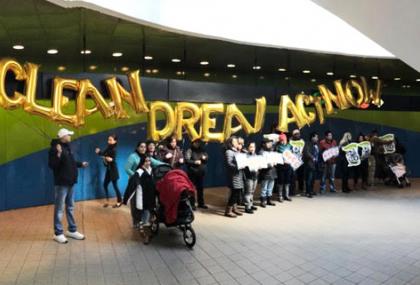
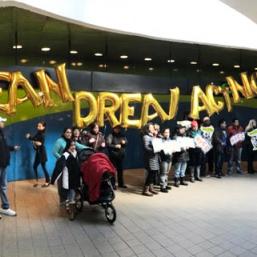
On November 16, CPD in partnership with Partnership for Working Families, New York Communities for Change, and Make the Road New York released a report identifying the ways Wall Street stands to benefit from Trump’s proposed border wall. Trump made his call for a wall along the U.S.-Mexico border a signature feature of his campaign for the presidency and his first year in office. A symbol of the rising tide of xenophobia and nationalism, the wall may be popular with Trump’s base, but is wildly unpopular with the public at large. This report looks at a set of players who are generally left out of Trump’s narrative about the wall, but who have positioned themselves to be direct beneficiaries: the investors who could enjoy financial gain from its construction. These players include JPMorgan Chase, Wells Fargo, Renaissance Technologies, BlackRock and Dimensional Fund Advisors. Read the report in its entirety on our website.
On October 31, 2017, the New York City Council passed Intro 1568-2017, establishing that no New York City resources can be used for federal immigration enforcement purposes. While New York City already had one of the strongest sanctuary laws in the country, immigrant-led groups like CPD's partner Make the Road New York (MRNY) have continuously pushed to limit local cooperation with the federal government’s mass deportation agenda to the maximum extent possible. The new legislation makes it illegal for the NYPD, or any city agency, to engage in, or assist federal authorities with, immigration enforcement.
Last March CPD, in partnership with Local Progress, hosted a convening in New York City for local elected officials working to expand sanctuary policies across the country. At that convening, City Council Speaker Melissa Mark-Viverito previewed New York City's plans to go even further to limit cooperation with ICE, and issued a call to other elected officials to stand in solidarity with immigrant communities. Since then, dozens of municipalities have taken additional steps to enact local laws and policies that will protect their immigrant residents from rampant immigration enforcement. CPD's sanctuary cities toolkit: "Protecting Immigrant Communities: Municipal Policy to Confront Mass Deportation and Criminalization," has helped to inform many of these efforts. The passage of Intro 1568-2017 is an especially important victory for New York City's immigrant communities because it comes at a times when cities that try to protect their immigrant residents are under attack by the Trump administration, which has threatened to deny funding to sanctuary cities, and to ramp up enforcement efforts in any city that refuses to facilitate unjust deportations.
Thanks to the relentless organizing by groups like MRNY, and to the courage of our local policy-makers, New York City continues to stand up to the Trump administration’s tactics of hatred and intimidation. With this new law in place, New Yorkers can feel comfortable accessing city services and interacting with local government officials without fear. It also ensures that no city agency, including the NYPD, can misuse city tax dollars to assist in the federal government’s mass deportation efforts.
On November 16, hundreds of people from Our City Our Schools, led by CPD affiliate 215 People’s Alliance, rallied to celebrate the end of the 16-year state takeover of Philadelphia’s schools and a return to local control, with a call for the creation of a People’s School Board. The vote to disband the Schools Reform Commission (SRC) marks a critical turning point for Philadelphia schools.
Members of Our City Our Schools watched the historic vote where members of the SRC voted themselves out of existence -- thereby returning Philadelphia’s schools to local control. Two weeks ago, Mayor Kenney announced his support for ending the state-controlled School Reform Commission -- a move that came after a year of concentrated organizing and campaigning by the Our City Our Schools coalition. Check out photos from the action on Facebook.
The Philadelphia victory is an important step towards a return to democratic control of schools and signals a powerful rebuke against the corporate education reform agenda. This community-led victory is not only significant for Philadelphia , but is part of a larger story developing across the country: Black and Brown communities are resisting state takeovers and the synonymous corporate education reform agenda that comes with such drastic measures. All eyes should be on the next phase in re-establishing local control in Philadelphia not only because of its local impact, but also because this will be an important part of the waves of resistance being led by Black and Brown communities across the country calling for equity, an end to education privatization, and the means to control their own destinies, starting with their schools.
On November 13, CPD and the Fair Workweek Initiative released “Job Quality and Economic Opportunity in Retail.” The growth of the service economy in the United States has profound implications for job quality and opportunity for working people today. With a workforce of nearly 16 million, the retail industry is now the largest employer of low-wage workers in the country. In an effort to identify strategies to support the retail workforce in attaining economic stability and preparing for the work of the future, the Fair Workweek Initiative conducted a national survey of the retail workforce to better understand how people working in retail navigate their careers and adapt to the demands of market forces. The report was featured in the New York Times. Read the full report on our website.



